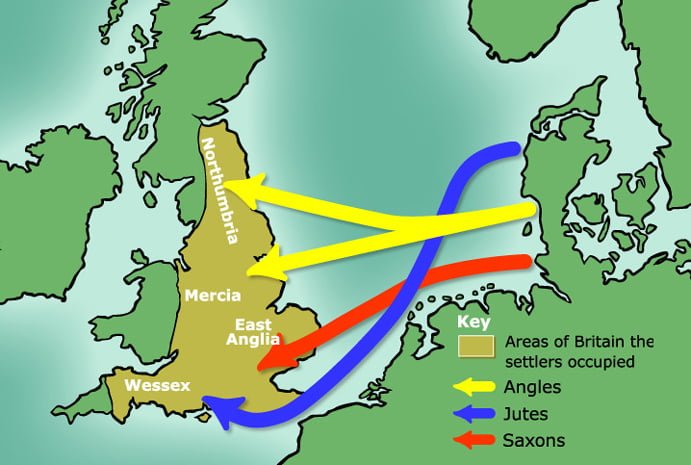Among the languages that enjoy significant prestige and history is obviously English. The greatness of English, ironically enough, was inherited not from the speakers it has today, and as the language of the Free World, but from its great history, a history of blood and sacrifice. So see how English stumbled its way to the modern world.
Old English: The Origins.
The story begins in the first millennium in Northern Germany, near Denmark. That’s where the roots of English are, not in England. After the bleeding Roman Empire collapsed and left Britain in the 5th century, three tribes from Northern Germany, namely the Angles, the Saxons, and the Jutes, invaded Britain and brought their language with them. The prominent tribe, viz. the Angles, named the land after themselves, i.e. Angle-land (England) as well as the language, i.e. Angle-

Source: BBC
From the 9th well into the 11th century, the Vikings and their language invaded Britain. The linguistic defeat, luckily, was slim to none, as Old Norse (the language of the Vikings) was very similar to Old English and, aside from borrowings, the language of the Anglo-Saxons didn’t change much.
Old English: French blood.
Here comes the French invasion now. In exactly 1066, William the Conqueror, or the Bastard, attacked Britain, bringing with him the Norman dialect of French, which soon became the official language of the ruling class, and the language of important business and political matters, and Old English was left for dead, but not for long.
Shortly after 1200, the Normans lost Normandy, and English staggered back up and
Examples of other Latinate words include: desist, donate, vibrate, etc. These words have a restricted syntax, for
Middle English: Silent vowels: “HERE WE COME!”
Let’s jump now right to the era in which Chaucer lived, spanning between 1100-1450; also called the Middle English period. It is in this period that really significant changes had been introduced to English. Before 1100, all syllables were articulated including those represented by what we call today silent vowel. For example, take would have been pronounced with two syllables as [theike]. In Middle English, final syllables had been reduced to the generic schwa (like
Early Modern English: The Great Vowel Shift.
Chaucer’s time is over. Now it’s Shakespeare’s time and the King James
Before the great vowel shift,
The causes of the Great Vowel Shift remain mysterious to this day. Some say perhaps that it was a way for the upper class to differentiate themselves from the lower class once Norman French became obsolete. Whatever the reason, it added more salt to the English wounds and we remain with probably the most dysfunctional spelling system across all languages. You don’t agree? Riddle me this: hear /hɪə(r)/, bear (animal) /bɛər/, heard /ˈhɝrd/?. No no no! Not just these: book /bʊk/, blood /blʌd/, could /kʊd/, etc. I can go on and on, but I think I made my point. Since this was inflicted on English by its people and not by some outside linguistic attack, I’d call it friendly fire. The Great Vowel Shift, to the people living through it, felt more like the 90s trend in the Chicago area where people started to pronounce hot like
Anyway, English people did not wake up one day and started to pronounce their vowels or their whole language differently out of thin air. Small incremental changes piled up over long periods of times resulted in the English that we know today. So, that’s in the most concise way possible the sum of important incremental changes that built up the English language, the most powerful language of all time.
What matters is that, against all odds, English pulled through. It had been the victim of multiple linguistic assaults but still managed to keep its English-y essence. For this reason, I believe English to be a living embodiment of the phrase “what doesn’t kill you makes you stronger.” This is a great linguistic victory worthy of so much praise.
As a bonus for coming this far, here is the whole history summarized the following timeline:

Source: Arrantpedantry







